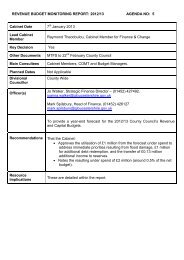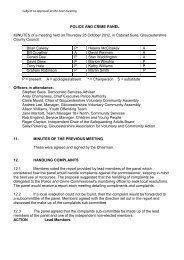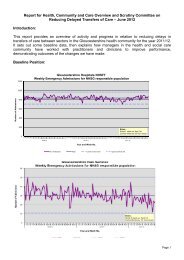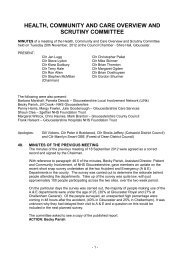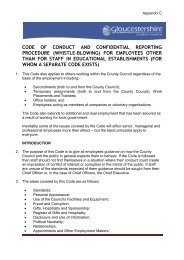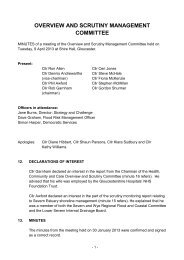Agenda item 4 - MTFS (Final) Cab 070213 , item 9. PDF 1 MB
Agenda item 4 - MTFS (Final) Cab 070213 , item 9. PDF 1 MB
Agenda item 4 - MTFS (Final) Cab 070213 , item 9. PDF 1 MB
You also want an ePaper? Increase the reach of your titles
YUMPU automatically turns print PDFs into web optimized ePapers that Google loves.
5.3 Total borrowing requirement at the end of 2012/13 is forecast to be £403.370m (equivalent to the CFR). This<br />
includes external borrowing of £328.301m, PFI lease liability of £22.377m and internal borrowing of<br />
£52.696m. The Council’s aim is to reduce the level of borrowing over the next few years, and where possible<br />
repay some of the existing debt. In 2012/13 £5.0m of maturing debt has been repaid through voluntary<br />
repayment.<br />
5.4 The Council has £41.05m LOBO loans (Lender’s Options Borrower’s Option) all of which are currently in, or<br />
will be in, their call period in 2013/14. A LOBO is called when the Lender exercises its right to amend the<br />
interest rate on the loan at which point the Borrower can accept the revised terms or reject them and repay<br />
the loan. LOBO loans present a potential refinancing risk to the Council since the decision to call a LOBO is<br />
entirely at the lender’s discretion.<br />
5.5 Any LOBOs called will be discussed with the treasury advisers prior to acceptance of any revised terms. The<br />
default position will be the repayment of the LOBO without penalty i.e. the revised terms will not be accepted.<br />
6 Debt Rescheduling<br />
6.1 The Council’s debt portfolio can be restructured by prematurely repaying loans and refinancing them on<br />
similar or different terms to achieve a reduction in risk and/or savings in interest costs.<br />
6.2 The lower interest rate environment and changes in the rules regarding the premature repayment of PWLB<br />
loans has adversely affected the scope to undertake meaningful debt restructuring, although occasional<br />
opportunities do arise. The rationale for undertaking any debt rescheduling would be one or more of the<br />
following:<br />
• Reduce investment balances and credit exposure via debt repayment<br />
• Align long-term cash flow projections and debt levels<br />
• Savings in risk adjusted interest costs<br />
• Rebalancing the interest rate structure of the debt portfolio<br />
• Changing the maturity profile of the debt portfolio<br />
6.3 Borrowing and rescheduling activity will be reported to the Audit Committee in the Annual Treasury<br />
Management Report and the regular treasury management reports presented to <strong>Cab</strong>inet.<br />
7. Annual Investment Strategy<br />
7.1 In accordance with Investment Guidance issued by the CLG and best practice this Council’s primary objective<br />
in relation to the investment of public funds remains the security of capital. The liquidity or accessibility of the<br />
Council’s investments is secondary, followed by the yield earned on investments which is a tertiary<br />
consideration.<br />
7.2 The Council and its advisors remain on a heightened state of alert for signs of credit or market distress that<br />
might adversely affect the Council.<br />
7.3 Investments are categorised as “Specified” or “Non-Specified” within the investment guidance issued by the<br />
CLG. Specified investments are sterling denominated investments with a maximum maturity of one year.<br />
They also meet the “high credit quality” as determined by the Council and are not deemed capital expenditure<br />
investments under Statute. Non specified investments are, effectively, everything else.<br />
7.4 The types of investments that will be used by the Council and whether they are specified or non-specified are<br />
as follows:<br />
79



